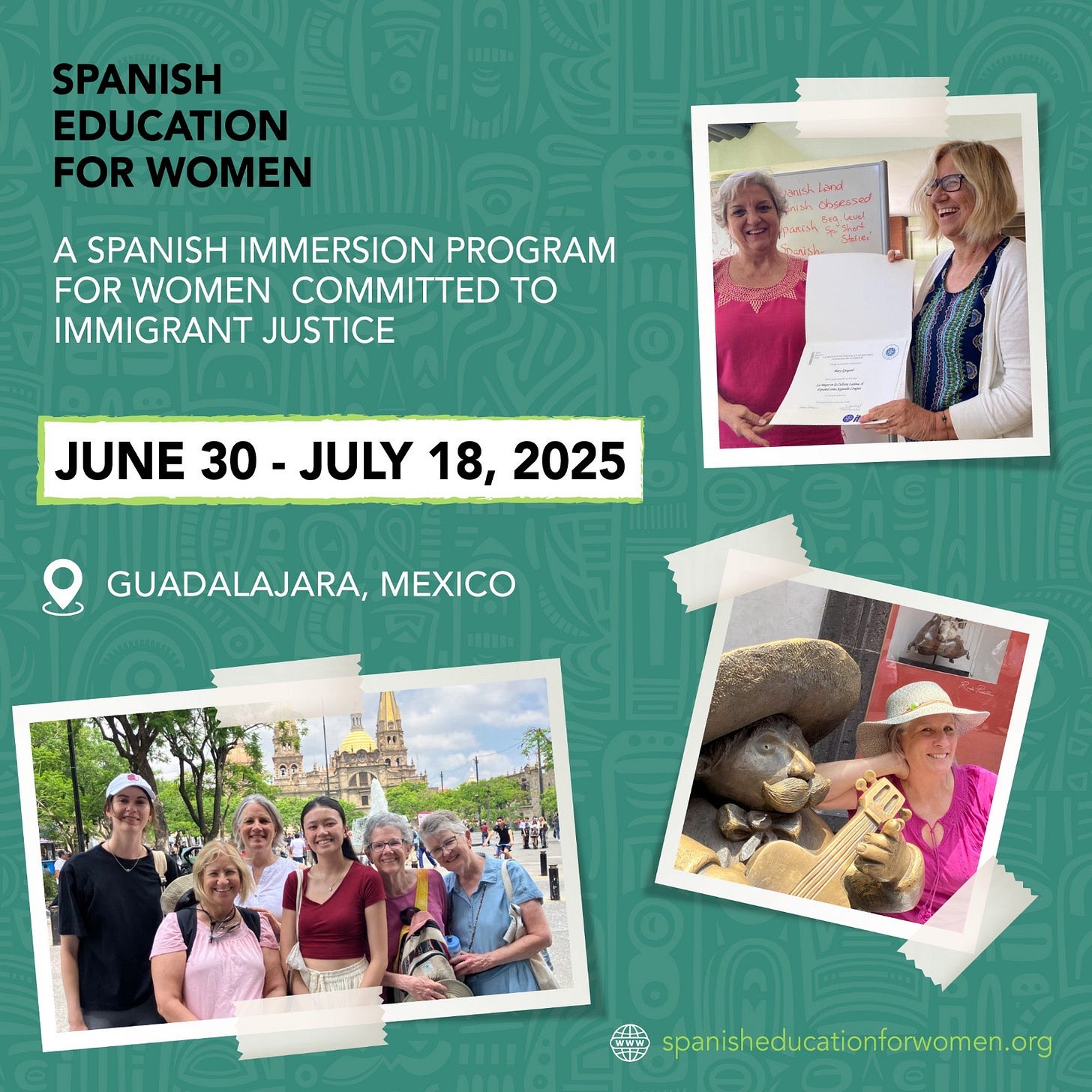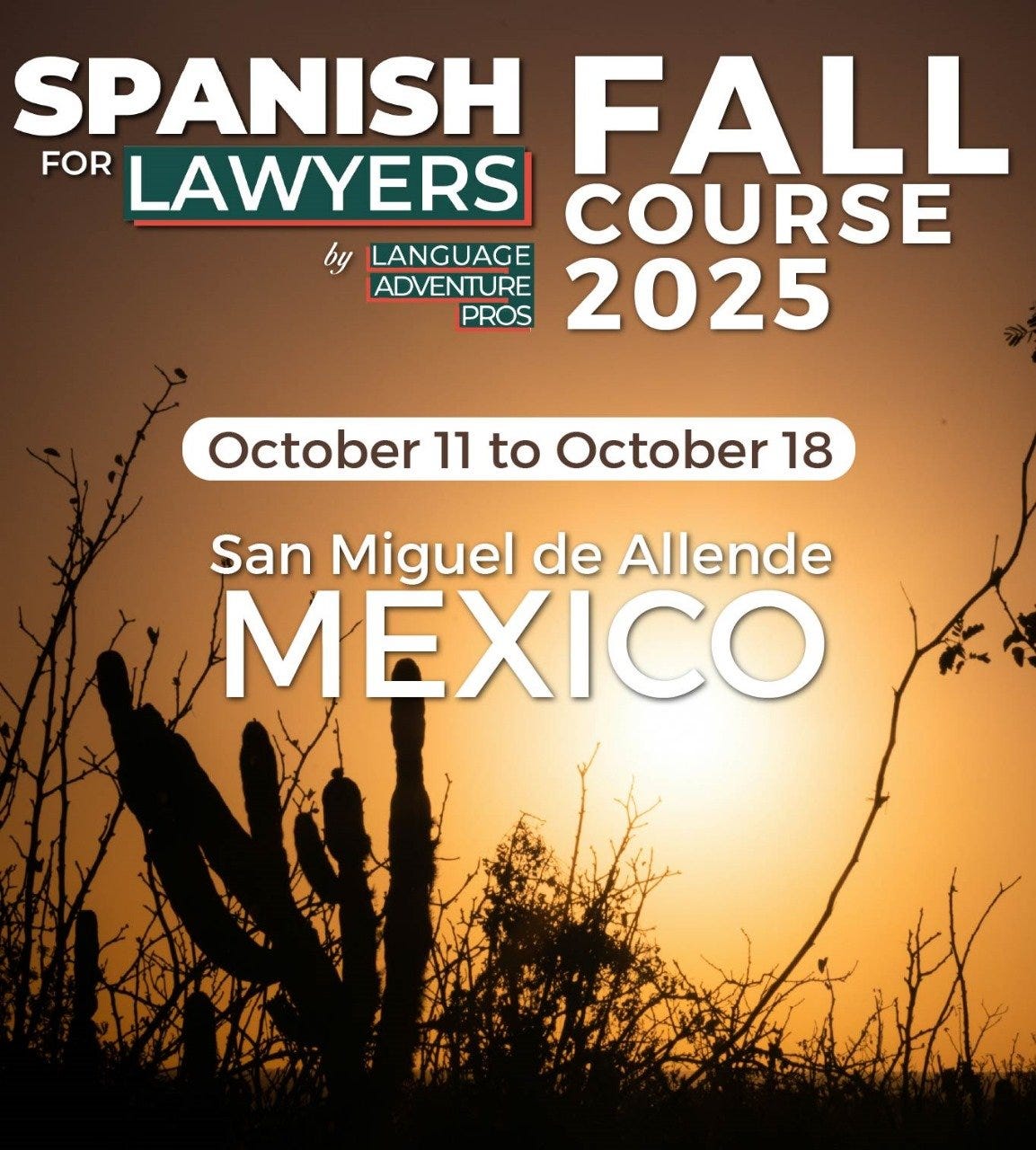Want to Help Immigrants? Learn Some Spanish.
Obviously other language skills are also useful. But in the U.S., being able to speak Spanish can go a long way.
I was an advanced student of Spanish in high school, but that was (ahem) a L-O-N-G time ago. So when I shifted the focus of my immigration law practice to working mostly with asylum-seeking families and unaccompanied minors from Central America, I knew I needed to re-learn the Spanish I had once known — and hopefully improve it considerably.
In 2014, I started visiting immigrant detention centers in New Mexico and Texas where the Department of Homeland Security (DHS) was detaining asylum-seeking families (women and minor children). As a volunteer lawyer, my task was to help detainees achieve release on bond, or make a case for asylum before an immigration judge. I would use an interpreter when speaking with the women, although I could understand most of what they were saying in Spanish. But there is no substitute for being able to talk directly to a person who is recounting the traumatic events — usually involving violence and persecution, which is to say the most horrifying experiences in their lives — that caused them to flee their home country and seek refuge in the United States.
A little more than 10 years later, I manage to butcher Spanish fluently. That is to say that I still make many mistakes, and often need to pull out my pocket-sized computer (i.e., my mobile phone) to use a translation app to find some necessary vocabulary. But I am able to speak, read and understand Spanish reasonably well.
Most of this learning has occurred through daily life in Mexico, where I have been spending several months each year since 2018 (with a long gap during the COVID pandemic from 2020-2021). But I jump-started my learning with the help of two fabulous Spanish language programs in Mexico, and I would like to recommend them here: Spanish Education for Women in Guadalajara, and Spanish for Lawyers in San Miguel de Allende. Both programs have upcoming sessions, in the summer (SEW) and the fall (Spanish for Lawyers) that any lawyers, paralegals, social workers or other immigrant advocates reading this might want to consider taking.
[NOTE: I am not receiving any compensation for these recommendations. I just really, really like these programs and want more people to know about them.]
Spanish Education for Women
In the summer of 2015, I spent two weeks with Spanish Education for Women (SEW) in Guadalajara, the second largest city in Mexico. Run by two retired American nuns — one of whom was a teacher of English as a Second Language (ESL) — SEW teaches Spanish to women committed to immigrant justice.
Dating back to the 1980s, the founders of SEW were working in the solidarity movement in response to U.S. involvement in the escalating civil war in El Salvador. Looking for a way to support activists, they landed on the idea of helping people learn Spanish. It wasn’t possible to bring people to El Salvador for that purpose in the midst of an ongoing war, so they used their church connections to find a parish — located in the working-class Polanco neighborhood of Guadalajara, Mexico — whose priest helped them find host families for American students.
Over the years, the SEW program has developed a robust network of host families, and has partnered with the Instituto Tecnológico y de Estudios Superiores de Occidente (ITESO), a Jesuit university in Guadalajara, which provides classroom space and local teachers. SEW also works hard to provide employment to young women in the Polanco neighborhood by hiring them to serve as “tutors” to the American students.
When I participated in this program in 2015, I was placed with a lovely three-generation extended family who welcomed me warmly into their home. While the program overall is not a full immersion language program — we were all at different levels of Spanish ability, and spoke English among ourselves — living with a host family provided a certain degree of immersion which was invaluable. In addition to learning a lot of colloquial Mexican Spanish, I came to understand the cadences of daily life in Mexico, including the large midday meal and subsequent siesta. I met the family’s neighbors and relatives, helped the señora in the kitchen, and even got to attend an adult daughter’s baby shower.
We would have classes at ITESO in the morning, and on some days — after eating a lunch packed by our host families — we would attend special lectures on topics of interest at the university. After a midday break, we would meet again back in the neighborhood, with the young tutors helping us with homework. One afternoon, we got a private cooking class. On another day, we visited a local public school. In the evenings, we would have a light supper with our host families.
We also visited a migrant shelter, FM4, which provides shelter and various legal and social services to migrants making their way through Mexico.
On weekends, there were excursions to sites of interest in and around Guadalajara. We saw some famous murals by renowned Mexican artist José Clemente Orozco in the Hospicio Cabañas, attended a performance of the Ballet Folklórico in the beautiful Teatro Degollado, and spent time shopping for handicrafts in Tlaquepaque (a beautiful city on the outskirts of Guadalajara).
By the end of my two weeks in Guadalajara (there is also an option to stay for a third week), I was able to hold basic conversations with my host family, and participate actively in discussions in language class and during guest lectures. For me, the program accomplished its purpose: it helped me revive my long-lost Spanish language skills, and made me feel more confident in speaking Spanish to clients.
Spanish for Lawyers
In 2018, after my husband and I had bought a little vacation house in the beautiful small city of San Miguel de Allende in Central Mexico (with the idea of possibly retiring there permanently someday), I met Rebecca Eichler, a U.S. immigration attorney who had recently moved to San Miguel with her family. She and her husband had previously spent an entire year traveling overland through Mexico and Central America, homeschooling their children and taking a break from the career rat race. You can read about their adventures in Rebecca’s husband’s amusing and informative travel memoir, The Year We Ruined Our Lives.
The title of the book is tongue-in-cheek, but in fact, they really did “ruin” their lives in one fundamental way: they ruined themselves for returning to a typical car-based suburban American life of full-time employment, kids’ soccer games, PTA meetings and the like. So after Trump was elected the first time, they made and executed plans for leaving the United States, and moved to San Miguel.
In the fall of 2018, I read on an immigration lawyers’ listserv an appeal for volunteer lawyers to travel to Mexico City. There was a caravan of migrants making its way north from the dangerous Northern Triangle of Central America, and there was a need for qualified U.S. immigration lawyers to advise migrants on what to expect when they reached the U.S.-Mexico border. I desperately wanted to heed the call, but couldn’t get away from my work in New York. But I passed on the information to Rebecca.
It turned out that the caravan changed course, and was headed up through Central Mexico, not far from San Miguel. So Rebecca posted on that same listserv and asked whether any volunteer lawyers wanted to come to her area to help her counsel people in the caravan. A lawyer named Charlene D’Cruz traveled down to Mexico, and Rebecca and Charlene drove Rebecca’s van (the same one she and her family had lived in during their year-long overland trip) to meet up with a caravan of 5,000 migrants. The iPhone videos and photos they took of that experience were later incorporated into a feature-length documentary, Las Abogadas: Attorneys on the Front Lines of the Migrant Crisis, about women lawyers who provided free legal advice to migrants at the border during the last two years of the first Trump administration and the first year of the Biden administration.
After recovering from the somewhat traumatizing experiences of counseling migrants in the caravan and at the border, Rebecca found a new mission: she created a San Miguel-based language program, Spanish for Lawyers, with the idea of providing language training to the next generation of immigration lawyers. Despite the name, the program is not limited to lawyers. Paralegals, law students, social workers and psychologists — anyone who works with Spanish-speaking immigrants in the United States — have also benefited from this program over the years.
I was one of the guinea pigs in the first Spanish for Lawyers session in the spring of 2019 — and happily so, as it was a fantastic experience. It is an intensive, weeklong course, where students are housed and take Spanish classes in a beautiful colonial-style villa. Mornings are devoted to small language classes, focused on helping you to expand your professional vocabulary and get comfortable using it. The afternoons include relevant outings including visits to a local market, a nearby indigenous village, and a migrant shelter (Albergue ABBA) founded and led by an inspiring pastor and his family.
San Miguel de Allende itself is a gorgeous, vibrant, colonial-era city in Mexico’s central highlands. It is full of color, art, music, delicious food, stunning architecture and beautiful cobblestone streets. Participating in the Spanish for Lawyers course in San Miguel provides an unparalleled opportunity for advocates to rest and re-charge while also learning Spanish and networking with like-minded professionals.
More Information
Obviously, nobody can become fluent in a foreign language after just one, two or three weeks. But there is no substitute for studying a language, taught by trained native speakers, in a country where you can immediately put what you’ve learned to good use.
There are many other worthy Spanish language programs in Mexico and other countries, but I can only speak about these two programs that I know about from personal experience. They were both excellent, well-planned, inspiring and effective programs. I highly recommend them both.
Summer Session 2025 runs from June 30 to July 18
Click here to request more information and an application








Careen: I already speak Spanish (grew up in Venezuela,) but I am not a lawyer. Is there any way I can help?